גיי איך מיר פֿון פֿראָנט מיט אַ גרויסער פֿרייד, [1]
וואָס איך בין געבליבן לעבן.
אוי, ווי איך גיי אַרײַן אין שטאָט און פֿרעג אָפּ מײַנע אייגענע
ענטפֿערט מען מיר קיינער ז׳ניט געבליבנ.
אוי, ווי איך גיי אַרײַן אין שטאָט און פֿרעג אָפּ מײַנע אייגענע
ענטפֿערט מען מיר קיינער ז׳ניט געבליבנ.
בין איך געבליבן שטיין מיט אַ גרויס געוויין
אין האַרצן איז געעפֿנט זיך אַ ווינד
אוי, אין אַ וואָסער זײַט איך גיב אַ קוק, שטעלן מיר זיך פּאָר –
מײַן ווײַב מיט מײַן איינאוניינסיק קינד.
אוי, אין אַ וואָסער זײַט איך גיב אַ קוק, שטעלן מיר זיך פּאָר –
מײַן ווײַב מיט מײַן איינאוניינסיק קינד.
וואָס איז דאָס פֿאַר איין צאָרן אויף אונדז געוואָרן
וואָס איז דאָס פֿאַר אַ גרויסער גזאַר?
אוי, פֿון דעם גרויסן צאָרן, זײַנען פֿיל מענטשן אַוועקגעפֿאָרן
די פֿאַרבליבענע זײַנען אַוועק אין באַבי–יאַר.
אוי, פֿון דעם גרויסן צאָרן, זײַנען פֿיל מענטשן אַוועקגעפֿאָרן
די פֿאַרבליבענע זײַנען אַוועק אין באַבי–יאַר.
בײַנאַכט און בײַטאָג האָבן געקלאפּט אַווטאָמעטן.
די מענטשן האָבן געזען פֿאַר זיך דעם טויט
אוי, בלוט האָט זיך געגאָסן פֿון אַלע זײַטן.
פֿון בלוט איז די ערד געוואָרן רויט.
אוי, בלוט האָט זיך געגאָסן פֿון אַלע זײַטן.
פֿון בלוט איז די ערד געוואָרן רויט.
דער גרויסער ווייטעק איז אויף אייביק פֿאַרבליבן,
וואָס דער דײַטש האָט פֿאַרגאָסן בלוט
אוי, מיט אונדזערע טרערן זאָל די ערד פֿאַרשלאָסן ווערן
אַז די לעבעדיקע זאָל שוין ווערן גוט.
אוי, מיט אונדזערע טרערן זאָל די ערד פֿאַרשלאָסן ווערן
אַז די לעבעדיקע זאָל שוין ווערן גוט.
אָבער אונדזערע סוינע זוכט ווי ער נאָך אַזוינע
ער וויל מיט זיי מאַכן איין האַנט,
אוי, ווי לאַנג ווי זיי וועלן לעבן וועלן זיי דאָס ניט דערלעבן
זיי וועלן קיינמאָל ניט זיין אין אונדזער לאַנד.
אוי, ווי לאַנג ווי זיי וועלן לעבן וועלן זיי דאָס ניט דערלעבן
זיי וועלן קיינמאָל ניט זיין אין אונדזער לאַנד.
וואָס איך בין געבליבן לעבן.
אוי, ווי איך גיי אַרײַן אין שטאָט און פֿרעג אָפּ מײַנע אייגענע
ענטפֿערט מען מיר קיינער ז׳ניט געבליבנ.
אוי, ווי איך גיי אַרײַן אין שטאָט און פֿרעג אָפּ מײַנע אייגענע
ענטפֿערט מען מיר קיינער ז׳ניט געבליבנ.
בין איך געבליבן שטיין מיט אַ גרויס געוויין
אין האַרצן איז געעפֿנט זיך אַ ווינד
אוי, אין אַ וואָסער זײַט איך גיב אַ קוק, שטעלן מיר זיך פּאָר –
מײַן ווײַב מיט מײַן איינאוניינסיק קינד.
אוי, אין אַ וואָסער זײַט איך גיב אַ קוק, שטעלן מיר זיך פּאָר –
מײַן ווײַב מיט מײַן איינאוניינסיק קינד.
וואָס איז דאָס פֿאַר איין צאָרן אויף אונדז געוואָרן
וואָס איז דאָס פֿאַר אַ גרויסער גזאַר?
אוי, פֿון דעם גרויסן צאָרן, זײַנען פֿיל מענטשן אַוועקגעפֿאָרן
די פֿאַרבליבענע זײַנען אַוועק אין באַבי–יאַר.
אוי, פֿון דעם גרויסן צאָרן, זײַנען פֿיל מענטשן אַוועקגעפֿאָרן
די פֿאַרבליבענע זײַנען אַוועק אין באַבי–יאַר.
בײַנאַכט און בײַטאָג האָבן געקלאפּט אַווטאָמעטן.
די מענטשן האָבן געזען פֿאַר זיך דעם טויט
אוי, בלוט האָט זיך געגאָסן פֿון אַלע זײַטן.
פֿון בלוט איז די ערד געוואָרן רויט.
אוי, בלוט האָט זיך געגאָסן פֿון אַלע זײַטן.
פֿון בלוט איז די ערד געוואָרן רויט.
דער גרויסער ווייטעק איז אויף אייביק פֿאַרבליבן,
וואָס דער דײַטש האָט פֿאַרגאָסן בלוט
אוי, מיט אונדזערע טרערן זאָל די ערד פֿאַרשלאָסן ווערן
אַז די לעבעדיקע זאָל שוין ווערן גוט.
אוי, מיט אונדזערע טרערן זאָל די ערד פֿאַרשלאָסן ווערן
אַז די לעבעדיקע זאָל שוין ווערן גוט.
אָבער אונדזערע סוינע זוכט ווי ער נאָך אַזוינע
ער וויל מיט זיי מאַכן איין האַנט,
אוי, ווי לאַנג ווי זיי וועלן לעבן וועלן זיי דאָס ניט דערלעבן
זיי וועלן קיינמאָל ניט זיין אין אונדזער לאַנד.
אוי, ווי לאַנג ווי זיי וועלן לעבן וועלן זיי דאָס ניט דערלעבן
זיי וועלן קיינמאָל ניט זיין אין אונדזער לאַנד.
[1] Trascrizione / Transcription:
Gey ikh mir fun front mit a groyser freyd,
Vos ikh bin geblibn lebn.
Oy, vi ikh gey arayn in shtot un freg op mayne eygene
Entfert men mir keyner z’nit geblibn.
Oy, vi ikh gey arayn in shtot un freg op mayne eygene
Entfert men mir keyner z’nit geblibn.
Bin ikh geblibn shteyn mit a groys geveyn
In hartsn iz geefnt zikh a vind
Oy, ikh a voser zayt ikh gib a kuk, shteln mir zikh por –
Mayn vayb mit mayn eynuneynsik kind.
Oy, ikh a voser zayt ikh gib a kuk, shteln mir zikh por –
Mayn vayb mit mayn eynuneynsik kind.
Vos iz dos far eyn tsorn af undz gevorn
Vos iz dos far a groyser gzar?
Oy, fun dem groysn tsorn, zaynen fil mentshn avekgeforn
Di farblibene zaynen avek in Babi-Yar.
Oy, fun dem groysn tsorn, zaynen fil mentshn avekgeforn
Di farblibene zaynen avek in Babi-Yar.
Baynakht un baytog hobn geklapt avtometn.
Di mentshn hobn gezen far zikh dem toyt
Oy, blut hot zikh gegosn fun ale zaytn.
Fun blut iz di erd gevorn royt.
Oy, blut hot zikh gegosn fun ale zaytn.
Fun blut iz di erd gevorn royt.
Der groyser veytek iz af eybik farblibn,
Vos der daytsh hot fargosn blut
Oy, mit undzere trern zol di erd farshlosn vern
Az di lebedike zol shoyn vern gut.
Oy, mit undzere trern zol di erd farshlosn vern
Az di lebedike zol shoyn vern gut.
Ober undzere soyne zukht vi er nokh azoyne
Er vil mit zey makhn eyn hant,
Oy, vi lang vi zey veln lebn veln zey dos nit derlebn
Zey veln keynmol nit zayn in undzer land.
Oy, vi lang vi zey veln lebn veln zey dos nit derlebn
Zey veln keynmol nit zayn in undzer land.
Vos ikh bin geblibn lebn.
Oy, vi ikh gey arayn in shtot un freg op mayne eygene
Entfert men mir keyner z’nit geblibn.
Oy, vi ikh gey arayn in shtot un freg op mayne eygene
Entfert men mir keyner z’nit geblibn.
Bin ikh geblibn shteyn mit a groys geveyn
In hartsn iz geefnt zikh a vind
Oy, ikh a voser zayt ikh gib a kuk, shteln mir zikh por –
Mayn vayb mit mayn eynuneynsik kind.
Oy, ikh a voser zayt ikh gib a kuk, shteln mir zikh por –
Mayn vayb mit mayn eynuneynsik kind.
Vos iz dos far eyn tsorn af undz gevorn
Vos iz dos far a groyser gzar?
Oy, fun dem groysn tsorn, zaynen fil mentshn avekgeforn
Di farblibene zaynen avek in Babi-Yar.
Oy, fun dem groysn tsorn, zaynen fil mentshn avekgeforn
Di farblibene zaynen avek in Babi-Yar.
Baynakht un baytog hobn geklapt avtometn.
Di mentshn hobn gezen far zikh dem toyt
Oy, blut hot zikh gegosn fun ale zaytn.
Fun blut iz di erd gevorn royt.
Oy, blut hot zikh gegosn fun ale zaytn.
Fun blut iz di erd gevorn royt.
Der groyser veytek iz af eybik farblibn,
Vos der daytsh hot fargosn blut
Oy, mit undzere trern zol di erd farshlosn vern
Az di lebedike zol shoyn vern gut.
Oy, mit undzere trern zol di erd farshlosn vern
Az di lebedike zol shoyn vern gut.
Ober undzere soyne zukht vi er nokh azoyne
Er vil mit zey makhn eyn hant,
Oy, vi lang vi zey veln lebn veln zey dos nit derlebn
Zey veln keynmol nit zayn in undzer land.
Oy, vi lang vi zey veln lebn veln zey dos nit derlebn
Zey veln keynmol nit zayn in undzer land.
Contributed by Dq82 - 2022/6/2 - 19:07
Language: Italian
Traduzione italiana / Italian translation / Traduction italienne / Italiankielinen käännös:
Riccardo Venturi, 25-8-2022 17:14
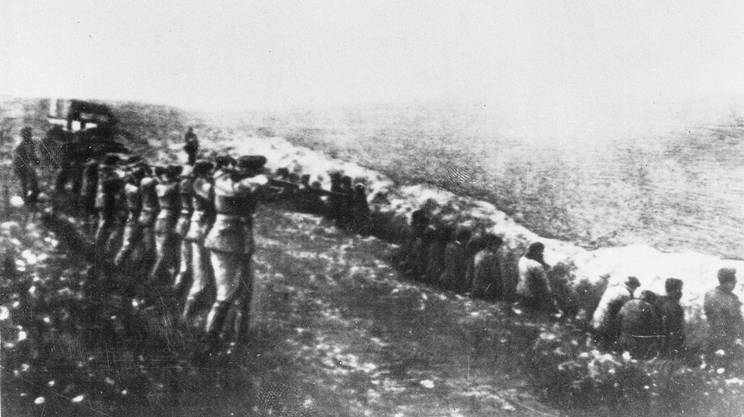
“La canzone si basa probabilmente su testimonianze oculari del massacro di Babij Jar, la gola presso Kiev dove 33.771 ebrei furono passati per le armi il 29 e 30 settembre 1941. I testimoni raccontarono del sangue che colava per le strade, di rumori di mitragliatici che si sentivano giorno e notte e di altre atrocità descritte nella canzone,
La canzone ci dice probabilmente qualcosa anche sul 1947, e non solo sul 1941; accenna infatti alla tensione etnica che si verificò nell'immediato dopoguerra tra gli ebrei che tornavano dalle retrovie sovietiche ed i loro ex vicini (russi e ucraini), generalmente ostili e comunque non molto felici del loro ritorno. I versi dell'ultima strofa si riferiscono probabilmente al timore di un ritorno dell'antisemitismo ispirato dai tedeschi.
La melodia è quella di In droysn geyt a regn e fu scelta non solo perché sembrava adattarsi perfettamente al toccante testo, ma anche perché era in risonanza con la canzone originale, un lamento per un amore perduto. La canzone di Golda Rovinskaja era ugualmente un lamento, ma per la perdita di un'intera comunità. La melodia fu imparata e registrata a New York da Michael Alpert (n. 1955), un compositore klezmer e interprete americano, nei primi anni '80 dalla voce di Bronya Sakina (1910-1988), n. Olvanisk (Holovanivsk / Golovanevsk), nativa dell'Ucraina sud-occidentale. [trad./ad. RV]
Riccardo Venturi, 25-8-2022 17:14

Babij Jar, 29-30 settembre 1941.
“La canzone si basa probabilmente su testimonianze oculari del massacro di Babij Jar, la gola presso Kiev dove 33.771 ebrei furono passati per le armi il 29 e 30 settembre 1941. I testimoni raccontarono del sangue che colava per le strade, di rumori di mitragliatici che si sentivano giorno e notte e di altre atrocità descritte nella canzone,
La canzone ci dice probabilmente qualcosa anche sul 1947, e non solo sul 1941; accenna infatti alla tensione etnica che si verificò nell'immediato dopoguerra tra gli ebrei che tornavano dalle retrovie sovietiche ed i loro ex vicini (russi e ucraini), generalmente ostili e comunque non molto felici del loro ritorno. I versi dell'ultima strofa si riferiscono probabilmente al timore di un ritorno dell'antisemitismo ispirato dai tedeschi.
La melodia è quella di In droysn geyt a regn e fu scelta non solo perché sembrava adattarsi perfettamente al toccante testo, ma anche perché era in risonanza con la canzone originale, un lamento per un amore perduto. La canzone di Golda Rovinskaja era ugualmente un lamento, ma per la perdita di un'intera comunità. La melodia fu imparata e registrata a New York da Michael Alpert (n. 1955), un compositore klezmer e interprete americano, nei primi anni '80 dalla voce di Bronya Sakina (1910-1988), n. Olvanisk (Holovanivsk / Golovanevsk), nativa dell'Ucraina sud-occidentale. [trad./ad. RV]
Babiј Jar [1]
Me ne vado via dal fronte assai contento
Di essere ancora vivo.
Ahi, quando torno in città e chiedo dei miei cari,
Mi viene risposto che non c'è più nessuno.
Ahi, quando torno in città e chiedo dei miei cari,
Mi viene risposto che non c'è più nessuno.
Me ne restavo là con gran pena,
Il cuore mi schiantava di tristezza.
Ahi, dovunque io guardi, mi si para davanti una coppia,
Mia moglie e il mio unico figlio.
Ahi, dovunque io guardi, mi si para davanti una coppia,
Mia moglie e il mio unico figlio.
Quali e quanti stenti abbiamo dovuto patire,
Chi ma ha decretato questa grande sventura? [2]
Da questa disgrazia molti sono sfuggiti,
Gli altri giaccion morti a Babij Jar.
Da questa disgrazia molti sono sfuggiti,
Gli altri giaccion morti a Babij Jar.
Giorno e notte crepitavan le mitraglie,
La gente si è vista la morte davanti.
Ahi, schizzava sangue da ogni parte,
La terra è diventata rossa di sangue.
Ahi, schizzava sangue da ogni parte,
La terra è diventata rossa di sangue.
Per sempre ci è rimasta la grande pena
Che i tedeschi abbian spillato sangue.
Ahi, la terra racchiuderà le nostre lacrime
E i sopravvissuti ne avranno del bene.
Ahi, la terra racchiuderà le nostre lacrime
E i sopravvissuti ne avranno del bene.
Ma il nostro nemico [3] cerca ancora altre vittime, [4]
Ne vuole fare un macello, [5]
Ahi, non vivranno abbastanza per vederlo, [6]
Non metteranno mai più piede nella nostra terra.
Ahi, non vivranno abbastanza per vederlo,
Non metteranno più piede nella nostra terra.
Me ne vado via dal fronte assai contento
Di essere ancora vivo.
Ahi, quando torno in città e chiedo dei miei cari,
Mi viene risposto che non c'è più nessuno.
Ahi, quando torno in città e chiedo dei miei cari,
Mi viene risposto che non c'è più nessuno.
Me ne restavo là con gran pena,
Il cuore mi schiantava di tristezza.
Ahi, dovunque io guardi, mi si para davanti una coppia,
Mia moglie e il mio unico figlio.
Ahi, dovunque io guardi, mi si para davanti una coppia,
Mia moglie e il mio unico figlio.
Quali e quanti stenti abbiamo dovuto patire,
Chi ma ha decretato questa grande sventura? [2]
Da questa disgrazia molti sono sfuggiti,
Gli altri giaccion morti a Babij Jar.
Da questa disgrazia molti sono sfuggiti,
Gli altri giaccion morti a Babij Jar.
Giorno e notte crepitavan le mitraglie,
La gente si è vista la morte davanti.
Ahi, schizzava sangue da ogni parte,
La terra è diventata rossa di sangue.
Ahi, schizzava sangue da ogni parte,
La terra è diventata rossa di sangue.
Per sempre ci è rimasta la grande pena
Che i tedeschi abbian spillato sangue.
Ahi, la terra racchiuderà le nostre lacrime
E i sopravvissuti ne avranno del bene.
Ahi, la terra racchiuderà le nostre lacrime
E i sopravvissuti ne avranno del bene.
Ma il nostro nemico [3] cerca ancora altre vittime, [4]
Ne vuole fare un macello, [5]
Ahi, non vivranno abbastanza per vederlo, [6]
Non metteranno mai più piede nella nostra terra.
Ahi, non vivranno abbastanza per vederlo,
Non metteranno più piede nella nostra terra.
[1] Un'occasione anche per riascoltare e rileggere la Sinfonia n° 13 “Babij Jar” musicata da Dmitrij Šostakovič su testi di Evgenij Evtušenko, dedicata al massacro di Babij Jar del 29 e 30 settembre 1941. La profonda gola che fu teatro del massacro si trova nei dintorni di Kiev; il suo nome (in russo Бабий Яр, in ucraino Бабин Яр /Babyn Jar/) significa “Gola della Vecchia”, così denominata da un atto di vendita del 1401 nel quale l'area veniva venduta da parte di una vecchia [baba] che abitava presso il convento dei Domenicani.
[2] Questo testo, redatto in uno yiddish autenticamente popolare, è ricco di passi non chiarissimi che devono essere un po' interpretati. Il testo dice qui letteralmente: “che razza di gran decreto/ordine/comando è?”; il termine gzar “decreto” è di origine ebraica e viene qui scritto foneticamente; normalmente si scrive גזר.
[3] Singolare con valore collettivo. Termine di origine ebraica qui scritto foneticamente; normalmente si scrive שֹונא (si rilevi anche qui l'estrema differenza tra la grafia fonetica sovietica e quella tradizionale ebraica).
[4] Alla lettera: “ma il nemico ne cerca altrettante”, o “altre di tali”.
[5] Espressione idiomatica: makhn eyn hant, lett. “farne una (sola) mano” cioè “eliminare, cancellare” ecc.
[6] Il testo originale è qui involuto, alla lettera: “finché vivranno non vivranno per vederlo” (questo il significato esatto di derlebn, ted. erleben).
[2] Questo testo, redatto in uno yiddish autenticamente popolare, è ricco di passi non chiarissimi che devono essere un po' interpretati. Il testo dice qui letteralmente: “che razza di gran decreto/ordine/comando è?”; il termine gzar “decreto” è di origine ebraica e viene qui scritto foneticamente; normalmente si scrive גזר.
[3] Singolare con valore collettivo. Termine di origine ebraica qui scritto foneticamente; normalmente si scrive שֹונא (si rilevi anche qui l'estrema differenza tra la grafia fonetica sovietica e quella tradizionale ebraica).
[4] Alla lettera: “ma il nemico ne cerca altrettante”, o “altre di tali”.
[5] Espressione idiomatica: makhn eyn hant, lett. “farne una (sola) mano” cioè “eliminare, cancellare” ecc.
[6] Il testo originale è qui involuto, alla lettera: “finché vivranno non vivranno per vederlo” (questo il significato esatto di derlebn, ted. erleben).
Language: English
English translation / Traduzione inglese / Traduction anglaise / Englanninkielinen käännös: Tova Benjamin
Babi Yar
I am bursting with happiness as I leave the front [lines],
[Overjoyed] that I am still alive,
Oh, but when I return to my city and ask about my loved ones.
They answer me, “none are left [alive].”
I am left standing still; overcome with grief,
My heart splitting open with sadness.
Oh, no matter where I look, I just see that pair,
My wife with my one and only child.
What hardships we’ve endured!
What kind of great evil decree is this?
Oh, from this misfortune, so many have fled [the city],
The ones left are lying [dead] in Babi Yar.
By night and by day the gunshots shattered,
The people saw their own deaths approaching.
Oh, blood gushed out from all sides,
The earth was stained red from [all the] blood.
This terrible pain is with us forever:
That the Germans have spilled so much blood.
Oh, the earth will be eternally sealed with our tears.
[Our cries:] those [still] living should be safe.
But our enemy is searching for yet another [victim]
To wipe away with one swipe.
Oh, as long as they are alive they won’t fulfill this.
They won’t ever step foot in our land.
I am bursting with happiness as I leave the front [lines],
[Overjoyed] that I am still alive,
Oh, but when I return to my city and ask about my loved ones.
They answer me, “none are left [alive].”
I am left standing still; overcome with grief,
My heart splitting open with sadness.
Oh, no matter where I look, I just see that pair,
My wife with my one and only child.
What hardships we’ve endured!
What kind of great evil decree is this?
Oh, from this misfortune, so many have fled [the city],
The ones left are lying [dead] in Babi Yar.
By night and by day the gunshots shattered,
The people saw their own deaths approaching.
Oh, blood gushed out from all sides,
The earth was stained red from [all the] blood.
This terrible pain is with us forever:
That the Germans have spilled so much blood.
Oh, the earth will be eternally sealed with our tears.
[Our cries:] those [still] living should be safe.
But our enemy is searching for yet another [victim]
To wipe away with one swipe.
Oh, as long as they are alive they won’t fulfill this.
They won’t ever step foot in our land.
Contributed by Dq82 - 2022/6/2 - 19:07
×
![]()
Note for non-Italian users: Sorry, though the interface of this website is translated into English, most commentaries and biographies are in Italian and/or in other languages like French, German, Spanish, Russian etc.

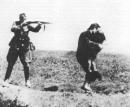
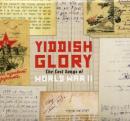
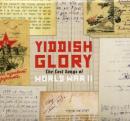
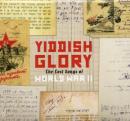
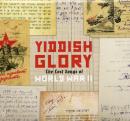
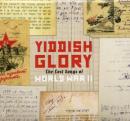

[1947]
Musica / Music / Musique / Sävel: In droysn geyt a regn
Album / Albumi: Yiddish Glory – The Lost Songs Of World War II [2018]
Babi Yar (Golda Rovinskaja)
Af hoykhn barg (Veli Šargorodskij)
Yoshke fun Odes (Berta Flaksman)
Mayn pulemyot (Anonimo / Anonymous)
Taybls briv (Taybl Birman)
Misha tserayst Hitlers Daytshland (Taybl Birman)
The song is likely based on eyewitness accounts of the massacre in Babi Yar, the ravine near Kiev, where 33,771 Jews were shot on September 29-30, 1941.
Witnesses reported blood pouring through the streets, gunshots throughout the day and night, and other atrocities, which are described in the song.
The song probably also tells us something about 1947, in addition to 1941. It hints at the immediate post-war ethnic tension between Jews, returning from the Soviet rear, and facing hostility from their former neighbors, who were not generally too happy about their return. The line “as long as they live, they will not see their victory in our land” probably signals the fear of a return of German-inspired antisemitism.
The tune of “In droysn geyt a regn” was chosen not only because it seemed to fit beautifully with the poignant lyrics, but also because it resonated with the original song, which lamented lost love. Rovinskaya’s song was also a lament but it mourned the loss of an entire community. This melody was learned and recorded in New York by Michael Alpert (born in 1955), an American klezmer composer and performer, in the early 1980s, from Bronya Sakina (1910-1988), b. Olvanisk (Holovanivsk/Golovanevsk), southwestern Ukraine.